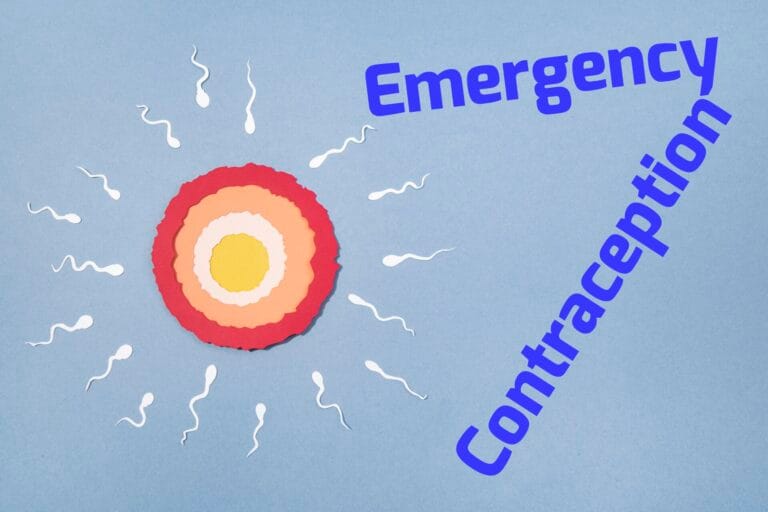What is Emergency Contraception (EC)?
Emergency contraception (EC) are the birth control methods which are used on an emergency basis, to prevent an unwanted pregnancy from happening after unprotected intercourse. It is also called Postcoital Contraception.
Emergency contraception is effective in preventing more than 95% of unwanted pregnancies when taken within 5 days of unprotected intercourse. However, for best results, you should not wait and take the EC as soon as possible. You should also consider using regular contraception, so that the need for emergency contraception does not arise.
Table of Contents
When is Emergency Contraception used?
Unprotected intercourse which can potentially lead to an unwanted pregnancy, is an indication for emergency contraception. So any woman, who is at risk of getting pregnant due to unprotected intercourse but does not want a pregnancy, is a candidate for emergency contraception. Unprotected intercourse includes all situations where birth control methods were either not used or were found to have failed.
Following are the most common indications where emergency contraception is advised:
- Contraceptive not used: When a couple forgets to use contraception during intercourse or does not use contraception by choice as in Nonconsensual sexual intercourse.
- Contraceptive failure: When contraceptive is used, but there are concerns about its efficacy. It can be due to incorrect use of contraceptive or accidental failure like a torn condom. Some examples of contraceptive failure are:
- Male barrier methods: When a condom is either not worn properly, slips off or gets torn during sexual intercourse. (see Barrier methods of contraception)
- Female barrier methods:
- When a woman forgets to wear her female condom, cervical cap or diaphragm before sexual intercourse.
- When the cervical cap or diaphragm are removed too early (prior to 6 hours after sexual intercourse).
- Accidental dislodgement of cervical cap or diaphragm (Barrier methods of contraception)
- Oral contraceptive pills:
- When a woman forgets to take her birth control pills
- When a woman does not take her pills at the same time daily and delays it by more than 3 hours, especially when taking progesterone-only pills. (see Birth Control Pills I Oral Contraceptive Pills).
- Using withdrawal or abstinence methods: There is a high failure rate with both methods.
How does Emergency Contraception act?
Emergency contraception prevents an unwanted pregnancy by one or more of the following mechanisms, depending on the method used:
- Emergency contraceptive pills act by preventing the release of eggs by the ovaries (prevent ovulation), so that the egg is not released by the ovary and sperms are unable to fertilize the egg.
- Copper-bearing intrauterine devices reduce sperm viability, making them incapable of fertilizing the egg. Even if the egg gets fertilized, they make the uterine wall less receptive to implantation of the fertilized egg.
REMEMBER: Emergency contraception only prevents a pregnancy from happening but does not cause an abortion or affect a pregnancy that is already present. So it should be taken as soon as possible after unprotected intercourse.
Types of Emergency Contraception
There are two methods of emergency contraception:
- Copper containing Intrauterine devices (Cu-IUDs) – most effective method.
- Emergency contraceptive pills (ECP)- most commonly used method.
Emergency Contraceptive Pill (ECP)
The emergency contraceptive pill (ECP) or the morning after pill is a high dose hormonal tablet which prevents or delays the release of an egg from the ovary. Since the egg is not released, the sperm is not able to fertilize the egg, thereby preventing an unwanted pregnancy.
It is less effective than a copper IUD but still, it is a highly effective form of emergency contraception and is the most commonly used emergency contraceptive method because of its ease of use and easy availability. Some EC pills are available over the counter while others need a prescription, depending on the local laws.
Broadly speaking, emergency contraceptive pills can be taken up to 4-5 days of unprotected intercourse, but their efficacy reduces with the passing time. So they should be taken as soon as possible after unprotected intercourse. Unlike the Copper IUD, the pill is only effective for emergency contraception. You have to opt for some other regular method of contraception for future birth control.
Types of Emergency Contraceptive Pills (ECP’s)
- ECP containing Ulipristal acetate: It is taken as a single 30 mg dose and is the most effective of all EC pills. Unlike other ECP’s, it can be taken up to 5 days after unprotected intercourse, without any significant decrease in contraceptive efficacy. The benefits of a single dose and lack of any major loss of contraceptive efficacy with time, make it the best of all ECPs. The best results are obtained when the pill is taken as soon as possible, preferably within 24 hours of unprotected intercourse.
- ECP containing Levonorgestrel (Progesterone only pill): It can also taken up to 5 days after unprotected intercourse, but it’s efficacy sharply declines after 3 days. So it should be used as soon as possible after unprotected intercourse for best results. Overall, it is less effective than the ulipristal EC pill but more effective than combined pill. Like ulipristal, the best results are obtained when the pill is taken as soon as possible, preferably within 24 hours of unprotected intercourse.
- Combined oral contraceptive pills (COCP): The combined oral contraceptive pills contain both estrogen and progesterone hormones and are not typically meant for emergency contraception. However, they can be used for emergency contraception when used in a higher dose than usual. Since different brands of COCP’s have different doses of the two hormones, you should consult your health care provider for the exact dose of a particular COCP to be used for emergency contraception. These are the least effective form of EC pills and have greater incidence of side effects like nausea and vomiting than the other ECP’s.
Advantages of Emergency contraceptive pills
- Highly effective
- Easily available
- Minimal side effects
- Does not have any long term effects on future fertility
- Does not require any special procedure by healthcare provider.
Side effects of Emergency contraceptive pills
The use of ECPs may be associated with certain side effects. Most of these side effects are mild, do not require any management and become better with time. You should consult your gynaecologist if the symptoms remain persistent, increase or become troublesome. The common side effects of ECP’s are:
- Nausea
- Vomiting
- Headache
- Fatigue
- Vaginal bleeding
- Abdominal pain
- Breast pain
Copper containing Intrauterine device (Cu-IUD)
Copper-IUD is a small T-shaped device which is placed inside your uterus by your gynaecologist for contraception or birth control. It can be used both for regular birth control or for emergency contraception. When used for emergency contraception, it should be inserted within 5 days of unprotected sexual intercourse, but the earlier, the better.
It is the most effective form of emergency contraception, with an efficacy of more than 99%. It acts by reducing sperm viability and making the uterine wall less receptive to the implantation of a fertilized egg. So sperms are unable to fertilize the eggs in the first place and even if they do so, the fertilized egg is unable to implant on the uterine wall.
Advantages of Cu-IUD
- Effectiveness: Most effective form of emergency contraception (99% efficacy).
- Long acting: Emergency contraception with Cu-IUD also serves as regular contraception and omits the need for any other form of contraception for 5-10 years.
- Easily reversible: Whenever you wish to plan a pregnancy, all you need to do is get it removed and fertility is restored promptly.
- No long-term effects on your future fertility.
- No hassle of remembering to use barrier methods regularly just before intercourse or taking the oral contraceptive pills regularly.
- Minimal side effects as compared to oral contraceptive pills with their systemic side effects.
Side effects of Cu-IUD
- Infection: Intrauterine placement is associated with a small risk of introducing infection in the uterus and causing pelvic inflammatory disease. But this risk is extremely low.
- Spontaneous expulsion: Sometimes, the intrauterine device may get expelled on its own within a few days after placement. So you may need to visit your doctor again for getting it placed again.
- Perforation: There is a small risk of causing a perforation of uterus during IUD placement.
- Lost IUD: The IUD has threads which hand out of the cervix into the vagina. For removal, your healthcare provider simply pulls the threads to take out your IUD. However, sometimes, the threads can’t be located and the IUD gets lost.
- IUD offers no protection against transmission of sexually transmitted diseases.
- It can be inserted or removed by a healthcare provider only. So you will need to visit your healthcare care provider, if you plan to use Cu-IUD.
- Some women tolerate the IUD very well, but some women may have painful and/or heavy menstrual periods for the first few months of IUD insertion, but it becomes better with time and the advantages far outweigh these minor problems.
Which patients can use Copper IUD?
Copper IUD can be used by any woman who wants emergency contraception, except the following:
- Women with perineal infections or pelvic inflammatory disease
- Women with high risk of chlamydia or gonorrhea infections like multiple sexual partners or nonconsensual sexual intercourse.
- Any growth or tumor of cervix (mouth of uterus), is a contraindication for Cu-IUD.
- Unexplained vaginal bleeding
FAQ’s regarding Emergency Contraception
Which emergency contraception is most effective?
Of all the emergency contraceptive methods, the copper-containing intrauterine device (Copper-IUD) is the most effective.
Can I use emergency contraception as my routine birth control method?
- Copper IUD: If a copper IUD has been used for emergency contraception, it will continue to provide effective birth control for the next 5-10 years. In this case, emergency contraception can be used as routine birth control method.
- Emergency contraceptive pill: If emergency contraceptive pills have been used for emergency contraception, then you should opt for another regular contraception method, as the emergency contraceptive pills are not recommended for regular birth control and are not as effective as many regular contraceptive methods.
Why I can not use emergency pill for regular contraception?
No, as the name suggests, Emergency contraceptive pills are for emergency use only. There are many reasons for this:
- They are less effective than the regular methods of contraception.
- The chances of failure are more.
- The side effects are more than regular contraceptive pills.
- Emergency contraception is associated with additional mental stress as you have to wait for your menstrual cycle or visit your gynaecologist to be sure that emergency contraception was effective and you are not pregnant.
Can the emergency pill fail?
The emergency contraceptive pills are very effective in preventing unwanted pregnancy after unprotected intercourse, but the no contraceptive method has a 100% efficacy. This is true for pills as well and can fail to prevent pregnancy even when used immediately.
Carry home message
- If you are not planning a pregnancy, you should opt for a regular contraceptive method, in discussion with your partner and your doctor. Taking regular contraception reduces your chances of the need for emergency contraception to a large extent.
- Copper IUDs are the best method of regular contraception for most women as it is highly effective (about 99% efficacy) and once inserted, gives continued protection for 5-10 years. It omits the need for regular use of contraception as with barrier contraceptives or oral contraceptive pills and is associated with fewer side effects.
- If you are taking birth control pills, ensure that you always have a stock of 2-3 months, so as to cover the risks of short market supply or not being able yo go out to get the pills or any reason. This stock reserve ensures that you never run out of pills.
- Emergency contraception should always be reserved for emergencies and is not meant to replace regular contraception.
- Copper IUD is the most effective form of Emergency contraception overall.
- Ulipristal acetate tablet is the most effective emergency contraceptive pill among the ECP’s.
- Emergency contraception should be taken as soon as possible after unprotected intercourse. As a general rule, the contraceptive efficacy decreases with passage of time.
- Always remember that emergency contraception only prevents an unwanted pregnancy, when taken timely. It does not affect a pregnancy that is already there, does not cause an abortion or affect your your future fertility in any way.

For more such interesting information on women's health, kindly visit our website Expert Gynae Care and our YouTube channel @drnidhigarg
To consult Dr. Nidhi Garg, please visit us at Kamal Hospital, Doaba Chowk, Jalandhar-144004 or Visit our website kamal Hospital jalandhar or Expert Gynae Care


